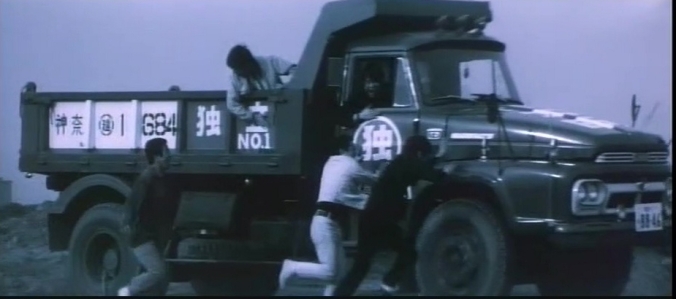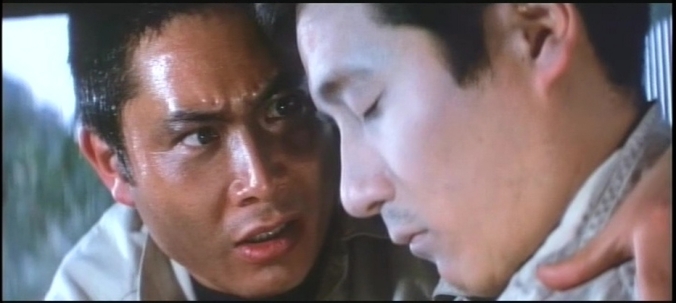 Two movies about boys sent to Tokyo as part of a government jobs project appeared in 1970, and they could not be more different. Shindo’s Live Today, Die Tomorrow is a bleak study of anomie, while Fukasaku’s If You Were Young: Rage* is wildly energetic and, for most of its length, a quite hopeful movie.
Two movies about boys sent to Tokyo as part of a government jobs project appeared in 1970, and they could not be more different. Shindo’s Live Today, Die Tomorrow is a bleak study of anomie, while Fukasaku’s If You Were Young: Rage* is wildly energetic and, for most of its length, a quite hopeful movie.
Asao and Kikuo are sent to Tokyo on a job scheme (called here the “Golden Eggs”) when all the mines close down in their home town. Things go reasonably well for them in their factory — low pay but steady work — where they meet three others from similar backgrounds: Kiyoshi whose fisherman father drowned and lost the family boat, Ryuji, a would-be boxer, and Ichiro. The factory suddenly goes bankrupt, leaving the boys with nothing to do. Rather spontaneously, the boys decide to save up for their own dump truck to be their own bosses. They live together, pool resources from a variety of odd jobs, and ultimately get enough money for the down payment. Along the way, however, they lose some of the boys. Ryuji is beaten to death by police in a labor dispute while Ichiro, now a waiter, falls in love with a bar hostess who gets pregnant, and she makes him ask for his money back. Kiyoshi ends up in jail after a robbery, ostensibly to get money for the truck. Nevertheless, Asao and Kikuo struggle on until at last they get their truck, christened “Independence #1,” because they expect to add a second and third and so on until they are a major trucking firm.
No one at this time, in Japan or elsewhere, was making movies of such pure kinetic energy. We first meet the boys running to their truck, in flashbacks we see all the boys running along with the imaginary truck, and most of the movie feels like it too is running. Flashbacks intermingle with present day almost at will, along with freeze-frames and other bits of the vocabulary of the New Wave. That energy is applied not to the college youth, the rock-n-roller, or the gangster but rather to the hope of the working-class entrepreneur – work hard, save your money, eventually start your own small business, no matter how small, and work hard some more to build yourself up, all without any outside help or anyone pulling strings for you – in a way rarely seen in movies. (The American independent semi-trailer drivers are our closest contemporary parallel.)
There are problems along the way, of course, but the possibility of success on their limited terms is always open; it is not a movie about how a cruel society crushes ambition. Like Fukasaku’s unknown masterpiece Wolves, Pigs, and Men, this is a portrait of a group of friends, something that is usually not a major subject in Japanese movies. Ichiro needs money for a new baby on the way, and Asao and Kikuo give it to him though he has long since left the partnership. This leaves them short of cash for their next loan payment, so they have to cross a picket line to get a load. This causes no more physical damage than some paint on their truck, but unspoken tensions between the two become more obvious. Kiyoshi escapes from jail, kills a policeman, and eventually ends up wounded at their apartment. He promises to turn himself in to the police in the morning, but when they return from a job, he is still hiding in the closet. He begs to go see the sea one last time and Kikuo refuses, siding with Kiyushi’s sister who has known him as a coward and a liar all her life, but Asao takes him in the truck, where all their hopes crash and burn.
If you know Fukasaku only from his yakuza films and Battle Royale, then you don’t know Fukasaku’s movies. This is as good a place as any to start. It is ultimately a quite suspenseful movie as it approaches its tragic end, but along the way it is exciting, invigorating, imaginative, and never boring.
*For inexplicable reasons, IMDB lists the date as 2000, the year of its first American film festival showing. It was actually released in Japan in 1970, though generally ignored by critics at the time.
“Kinetic energy” made me think of Hard Day’s Night and other British films of the 60s.
LikeLike
Yes, there is a sense in which Fukasaku’s movies at this time remind a great deal of Richard Lester’s movies in particular, but without any of Lester’s sense of “fun.”
LikeLike
While Kinji Fukasaku is best known for his yakuza (gangster) films, he also directed some outstanding samurai movies including: “The Yagyu Conspiracy” (Yagyu Ichizoku no Inbo) which spawned the hit TV show of the same name; supernatural and/or fantasy films “Samurai Reincarnation” (Makai Tensho), “Legend of the Eight Samurai” (Satomi Hakkenden); historical made for television movie “The Abe Clan” (Abe Ichizoku no Inbo); and two films that take very different looks at the tale of the 47 ronin, “The Fall of Ako Castle” (Ako-jo Danzetsu) a straightforward retelling of the historical event and the remarkable “Crest of Betrayal” (Chushingura Gaiden-Yotsuya Kaiden) which blends two of Japan’s most famous revenge stories into one. Starring Koichi Sato (son of samurai legend Rentaro Mikuni) and the buxom Saki Takaoka, this movie features one of the greatest lines in filmdom. After Iemon brutally cut down and robbed a victim on the street, he returns home where his father greets him with suspicion. Asked by his father to show his sword Iemon struggles to remove it from its sheath, His father looks at him with disdain and announces what a disappointment it is that the foremost lesson he taught his son was forgotten. His fury towards Iemon was not about the murder and robbery, but that he had failed to clean the blood from the sword before returning it to the sheath! A great moment in movie history.
LikeLike
Pingback: Attack at Noon / Attack on the Sun / Hakuchu no shugeki (1970) | Japanonfilm
Pingback: Preparation for the Festival / Matsuri no junbi (1975) | Japanonfilm
Pingback: Always: Sunset on Third Street / Always san-chome no yuhi (2005) | Japanonfilm